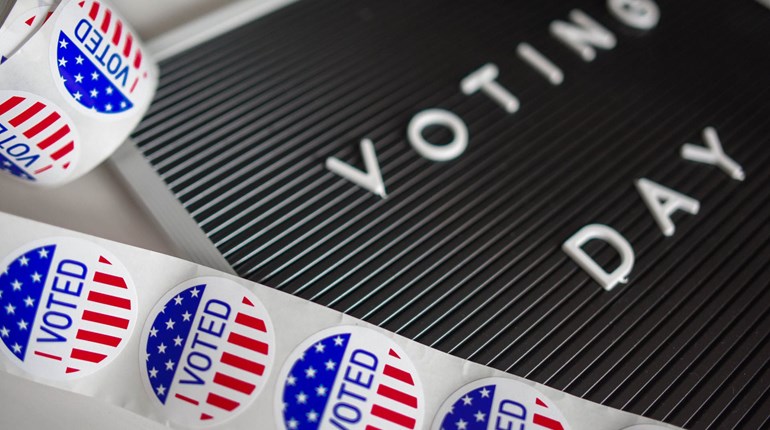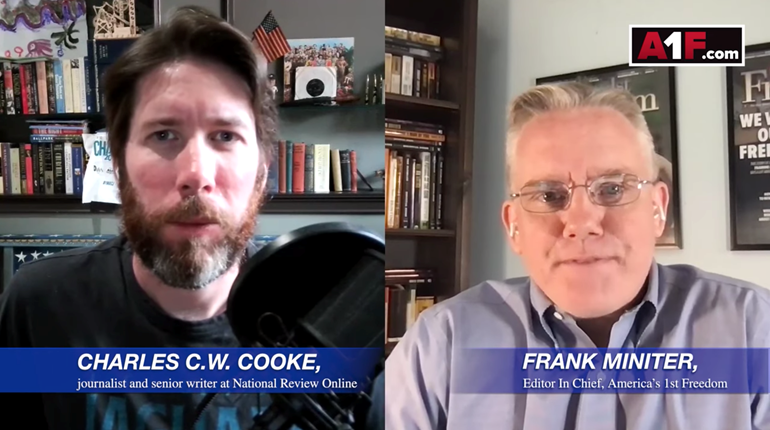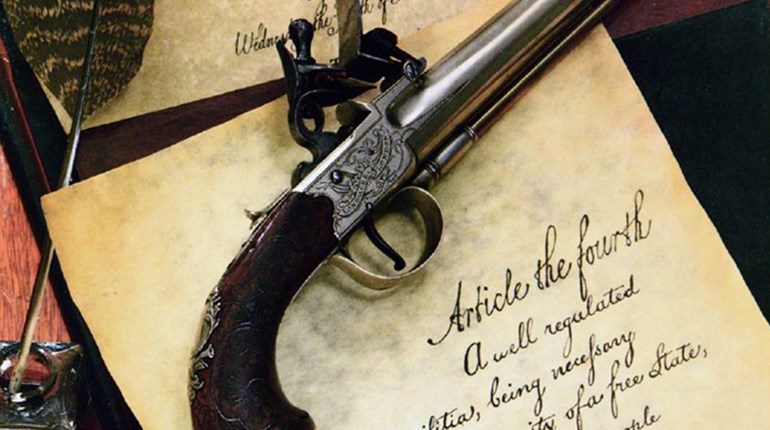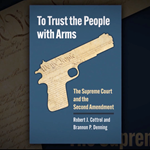
In times of conflict, those seeking security nearly always call for the loss of liberty.
This feature appears in the July ‘17 issue of NRA America’s 1st Freedom, one of the official journals of the National Rifle Association.
There comes a point during every political argument at which persuasion gives way to badgering and the specters are wheeled out to do their haunting worst. In contemporary conversation, this tendency is particularly acute when the topic is individual liberty. There you are, calmly making your case for human freedom, and all of a sudden a bugaboo appears upon the horizon to shout wildly about safety and recklessness. Thus are conversations about the appropriateness of the TSA transmuted into accusations that its critics are “siding with the terrorists.”
Thus, to defend free speech on campus and beyond is to be deemed “indifferent” or “hostile” toward the feelings of those who might be offended.
Thus, to go to bat for due process is to be charged with “denying” the existence of crime.
To paraphrase the immortal “Anchorman,” these things escalate quickly.
In the last few years, this most pernicious of habits has made its merry way into the gun control debate. To favor the broad preservation of the right to keep and bear arms, we are now told, is to be on the same side as ISIS. That, at least, was the clear message when the Democratic party tried to strip everyone on the sprawling “terror watch list” of their right to purchase a gun. It was the clear message when President Barack Obama called for more restrictive laws during his condemnation of the attacks in Orlando, Fla., and San Bernardino, Calif. And it is the clear message now that America’s would-be gun controllers have decided to take yet another shot at closing the mythical “gun-show loophole.” In a fact-challenged post on New York magazine’s website, Eric Levitz recently proposed that America’s legal status quo was admired by two discrete groups: “the National Rifle Association (NRA)—and the Islamic State of Iraq and Syria (ISIS).” In case the point was lost on his readers, Levitz spelled it out for posterity: “ISIS,” he added, “approves of America’s lax gun regulations.”
It is clichéd to propose that hysteria is the most potent enemy of any great republic, but it is clichéd for a solid reason: It is true.Such tactics are not new. Long before anybody had heard of ISIS or of Osama bin Laden or of the threat of “global terror,” the charge that protecting liberty would “let the bad guys win” was routinely used as a cudgel and an apology for the diminishment of individual rights. Writing in 1783, the great British statesman William Pitt the Younger observed that “necessity is the plea for every infringement of human freedom. It is the argument of tyrants; it is the creed of slaves.” How right he was. Indeed, it is as a response to this tendency that the Bill of Rights was included in the Constitution—so that the mob’s being whipped into a frenzy would not lead inexorably to the diminution and removal of the freedoms of the good.
Rare is the occasion on which a free people can be convinced to hand over their liberty for a mess of pottage. But add in a hobgoblin or two—and start piping in the sound of war drums—and that resolve is quick to fail. It is not actually true, as Levitz suggests, that gun shows are exempt from federal law. Regardless of where a gun is sold—be it in a kitchen, a store or a gun show—the same rules apply to all FFLs. It is not clear, either, why this particular moral panic has reared its ugly head; does America have a problem with terrorists frequenting gun shows? The answer is absolutely not. But it sounds scary and provides moral satisfaction to its purveyors, and those two things, when combined, can provide sufficient impetus to bring about a change in the law.
’Twas ever thus. Over the years, Americans have proven alarmingly open to being the authors of their own decline. The greatest threats to American free speech have come not from invading armies or insurrectionist forces, but from within the democratic polity. The Alien and Sedition Act of 1798 and the Espionage Act of 1917 were both rationalized by references to the supposedly pressing threats presented by a faraway foe. As Justice Roger Taney made clear in his execrable Dred Scott opinion, the prospect of African-Americans being permitted “to keep and carry arms wherever they went” was so horrific that gun control was needed post haste. It is clichéd to propose that hysteria is the most potent enemy of any great republic, but it is clichéd for a solid reason: It is true. Ghosts, alas, are the most effective slayers of rights.
When confronted with the charge that by keeping one’s rights intact, one wants to help arm ISIS, the first instinct is to issue a denial, then to ask what exactly has caused the consternation in the first place. “Is it really the case,” one might credibly ask, “that terrorists struggle to get hold of weapons?” But as inviting as this tack may be, it is nevertheless the wrong one. The right response is to ask, “Why should I give a hoot what a bunch of murderous thugs think of my liberties?” The Declaration of Independence, you will recall, is emphatic on both the provenance and applicability of the “certain” rights to which all Americans are heir, and it does not accord a veto to those who would destroy them. On the contrary, the very reason that we have a government in the United States is to “secure these rights”—and, by implication, to destroy those who would subvert them. To propose that the state should diminish our liberties because they are being rendered inconvenient by our enemies is to upend the entire American settlement and to return to barbarism. I daresay that my rights sometimes serve as an impediment to the government’s ability to carry out its business. But that, ultimately, is immaterial. It would be farcical for the states to try to protect a people from those who would strip away their rights by ... stripping away their rights.
To propose that the state should diminish our liberties because they are being rendered inconvenient by our enemies is to upend the entire American settlement and to return to barbarism.Especially when those rights serve as the citizenry’s last line of defense against incursions large and small. Adm. Isoroku Yamamoto may not actually have said that Japan could not afford to “invade the mainland United States” because “there would be a rifle behind every blade of grass,” but if he had, he would have been correct. Now, as was ever the case, the citizenry is indispensable to its own security. There is a reason why, as secretary general of Interpol, Ronald Noble proposed that societies meditating upon the problem of terrorism would be well-advised to say, “We want an armed citizenry,” and that reason is that an armed citizenry makes it tough for the villains to cause havoc. Ruminating on the massacre at Nairobi’s Westgate Mall, Noble invited the public to ask, “If that was Denver, Colo., if that was Texas, would those guys have been able to spend hours, days, shooting people randomly? ... People are quick to say ‘gun control, people shouldn’t be armed,’ etc. I think they have to ask themselves: ‘Where would you have wanted to be?’ In a city where there was gun control and no citizens armed if you’re in a Westgate Mall, or in a place like Denver or Texas?”
Noble’s question was not a rhetorical one, yet some in the United States still seem to struggle with its implications. Indeed, in a handful of cases, American officials appear downright confused. Take, by way of example, former Washington, D.C., Police Chief Cathy Lanier, who has simultaneously been hostile toward the restoration of concealed carry in the District and asked its residents to help her fight terrorism—literally. In November 2015, just after the massacre at the Paris Bataclan, Lanier channeled the old spirit of “hue and cry,” and encouraged anyone caught in a terrorist attack “to try to take the gunman down, to take the gunman out.” Such direct action, Lanier argued, represents “the best option for saving lives before the police can get there.” A few months earlier, however, she had screamed bloody murder after a district judge had ordered her department to offer carry permits to more than just the well-connected and wealthy in the city, and she had made sure to assure the general public that she would fight the reintroduction of carry rights to the capital every inch of the way. What, one wonders, did Lanier expect Americans to fight her necessary fight with? Spoons?
And what does she believe her role to be? Is her job to facilitate the safety of the people or to make sweeping decisions about their lives? Once again, one wonders whether we have forgotten why we have a government. In 1788, a vexed Patrick Henry worried aloud that the new Constitution would not do enough to protect freedom. “You are not to inquire how your trade may be increased,” he told his fellow anti-federalists, “nor how you are to become a great and powerful people, but how your liberties can be secured; for liberty ought to be the direct end of your Government.”
Such statements seem almost quaint now. In our era, politicians spend much of their time proceeding as if the voting public had invited them to design a masterplan that touches every aspect of civil society, and to do so without reference to their enumerated roles. In this context, inquiries as to whether our sworn enemies find our unalienable rights useful to their plans make perfect, unimpeachable sense. In Henry’s context, they do not. Which context Americans wish to live in is up to them. When choosing, they should elect to ignore the men with the ogres on their shoulders.
Charles C.W. Cooke is the editor of National Review Online.


































